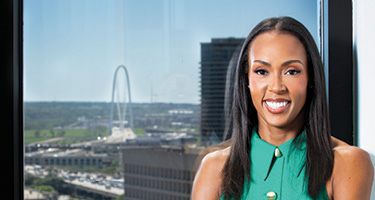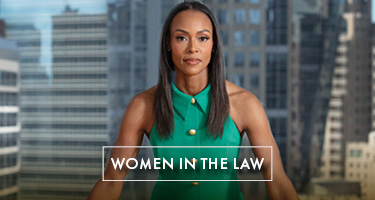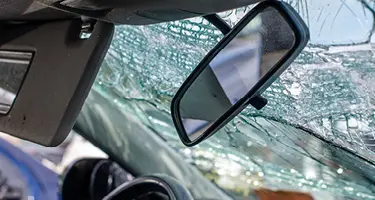FARAH F. COOK grew up watching her father, Abdul “Duke” Fakir, perform with Rock & Roll Hall of Famers the Four Tops, the esteemed Motown quartet that has sold some 50 million records. Although joining him in the limelight was always an option, Cook’s interest lay primarily behind the scenes. From the start, her preference was to help her father with the business side by lingering backstage, talking to his management team to better understand the mechanics of the music business and learn how deals get made. These formative experiences greatly influenced her ultimate decision to pursue a career in law.
Today, Cook is a Howard University School of Law graduate, a partner at Kilpatrick Townsend in Atlanta and a seasoned, sought-after intellectual property and technology-focused lawyer. Her enduring passion for business deals and defending her clients’ interests led to her recognition in 2020, 2021, 2022 and 2023 by The Best Lawyers in America® for IT Outsourcing Law. She was also named a Best Lawyers “Lawyer of the Year” in Atlanta in 2023 for IT Outsourcing Law, a recognition that honors one lawyer in each practice area and metropolitan area who received the highest peer feedback.
Best Lawyers recently sat down with Cook over Zoom. During the conversation, which has been edited for length and clarity, she discussed her career, community involvement and one of the year’s hottest topics, artificial intelligence.
Before touching on your legal career, I wanted to ask about your B.A. in French from Spelman College and your M.A. in French Cultural Studies from Columbia University. Why French?
I started studying French in the fourth grade. It came relatively easy to me and was something I enjoyed. It also allowed me to attend graduate school in France—and later I did a comparative law program in Paris. It’s just something that is really important to me.
Has your knowledge of French helped you in your legal career?
It has, actually. Going back to the beginning of my career, my first law firm that I chose was an international firm with only two domestic offices. And so that was the main reason that I chose that firm. My initial practice areas included international arbitration and antitrust, so many of my clients at the time were internationally based. And so it was, it was definitely a choice. It was part of the decision, and how I viewed the path that my legal career would take. There was a period though, where I really didn't use my French language. When I moved back to Atlanta in 2006, I wasn't using it very much, and I didn't have a need to start using it until I joined Kilpatrick Townsend in 2018. One of my partners has a similar background to me and has quite a few French clients. He and I work together on a number of transactions.
What led you to law school?
By the time I started Spelman College, I knew that I wanted to go to law school, so that was never a question. The question was what I was going to major in. I knew that I loved French and wanted to continue to study abroad before going to law school. Columbia University offered a one-year Master of Art’s program in French cultural studies, and it was the perfect bridge for me before going to law school.
My interest in law school came early and in a unique way. My dad is the last living member of the [original] Four Tops, a big Motown singing group. When I was younger, I used to go to all their concerts and hang out backstage. Although I went onstage with my dad a couple times, that was never really my thing. Instead, what I really enjoyed and preferred was to be backstage talking with his agent, his lawyer and his accountant to understand the business of what he was doing. My dad also used to do a lot of commercials with consumer brands, and I wanted to know how those deals happened. That was the start of my wanting to become a lawyer. And then, as I got older, I was like, “Well, I really want to help you. How can I help you?” That has always been the underfooting of my practice. Even now, my goal is always to just help my clients.
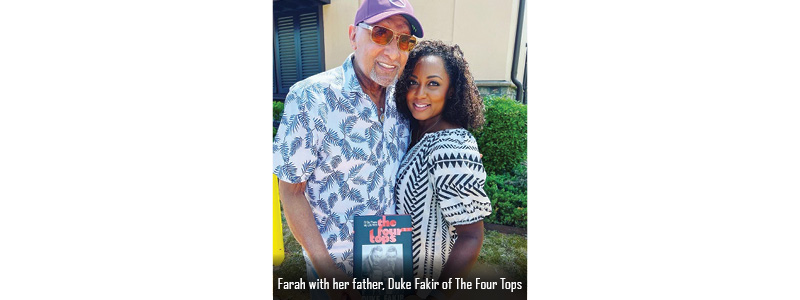
How would you describe your practice?
I have a broad client base in Atlanta, outside Atlanta and some international clients as well. I work across industries, from media to manufacturing to logistics.
My practice is a combination of intellectual property and technology transactions. More often than not, I’m helping a client buy, sell or license some aspect of technology, media or content; or providing advice related to emerging technology. It can take the form of a lot of things across industries, whether it’s dealing with agricultural technology, an artificial intelligence software platform or an advertising issue. That’s the easiest way to boil down my practice.
On an intellectual level, which cases or clients really pique your interest?
The ones I’m fascinated with are often those larger corporations with groups that have a mission to start up new products because they’re really innovative. They are very intellectually challenging because they’re always trying to do something new and different that hasn’t been done before. It allows me to think outside the box, and they’re just fun to work with because of the speed at which they operate.
Which career milestones most stand out to you?
That's a great question. Some of my greatest milestones have come from being an advisor to my amazing clients. However, some have have really come in different ways. There's a National Bar Association conference that I participate in called the Commercial Law Section Annual Conference. I participated as a junior lawyer, mid-level lawyer and now a more experienced lawyer, and when I was younger, I always looked at some of the other well-known lawyers like, “wow, how do I get to actually be up there and talk and give presentations?” And now, I'm one of those lawyers, giving presentations all over the country. And for me to be able to see younger lawyers look at me the same way is really the biggest accomplishment for me.
What about your community involvement?
I’m very involved in the community—that’s a highlight of my life. I serve on the board of directors of the Fernbank Museum of Natural History here in Atlanta. It allows me to contribute to helping kids from underserved neighborhoods as well as kids from across Atlanta to have access to science and natural history. I’m also involved in other organizations across Atlanta where I’m able to focus a lot on kids with regard to education, the arts and science.
Mentorship is also huge for me, particularly mentoring women and women of color in the legal profession. I’m often the only woman or woman of color in the room. So, it’s incredibly important to be able to bring up younger lawyers who have any interest in doing transactional or corporate work.
One of this year’s hottest topics is artificial intelligence, both generally and in law. Do you remember when you first heard about AI?
The first time I thought about it in the context of law and my practice was five or six years ago, when I was working on different types of video game transactions where an AI algorithm was being used. They involved virtual reality, augmented reality and all those kinds of emerging technologies. That was the first time I thought about it within the context of my career.
What were your thoughts at the time? Did you think it would one day become ubiquitous?
Yes, absolutely. It seemed like AI would become very widespread. This would be the future of technology.
What do you think of those who warn that AI is moving too fast? Is that a concern?
I think that with any type of evolutionary innovation, there’s always a reason to think about its possible implications. But I wouldn’t necessarily say, “Hey, we need to stop,” because I think it’s the nature of innovation. You could probably say the same thing for anything new and emerging.
Is AI something your firm and legal practice would consider using?
Our team has talked about AI for various uses, but we have questions about its veracity and how it could be safely used. Because ultimately, we would have to go back and check the work, which could negate the efficiency. So, we think about it in the context of what we can do to safely and securely create more efficiencies.
Is AI something that comes up with your clients?
It’s definitely a question that comes up. There are certain types of transactions that involve AI. There are also certain companies that ask questions about whether they should be concerned about it. Issues related to AI are at the forefront of most people’s discussions right now.
Are current IP laws equipped to deal with the emerging issues AI will bring forth?
That’s a great question, one that is always asked. Years ago, when Napster and all those types of music technologies came out, the question was, “Oh, my gosh, is IP law ready for this if it wasn’t made for this?” And the answer is: We’ve got really strong, great IP laws, and there are foundational principles that will transcend technology. It always comes down to how people use them.
Many people seem hesitant—fearful, even—of the implications AI could have on the world. Programs like ChatGPT are becoming very popular but are not without risk. Do you have any trepidations about what’s in store for AI?
I generally do not operate from a place of fear, and rather from a place of curiosity, so I’m working to learn as much as I can about ChatGPT and generative AI, and I know my firm as a whole is taking the same approach. Our firm has assembled a multi-disciplinary group of lawyers across the firm, of which I am a part, to understand the risks and advise clients appropriately.
We’ve got really strong, great IP laws, and there are foundational principles that will transcend technology."
Can you think of any ways in which AI might become a benefit to you and your clients? How are you and your firm preparing to brace for the impacts of AI and what they could mean for your legal work in the next five or ten years?
Generally, my clients use technology to create efficiencies or as a component in monetizing a product, so I view the expansion of technology as a good thing. As lawyers our job is always to consider all of the information that we have and make the best decisions with what we know, so even though there are new programs, my approach to advising my clients and mitigating risk will not change. AI will likely be beneficial to me, my firm and others in ways that we cannot currently imagine. That is the beauty of innovation and technology.
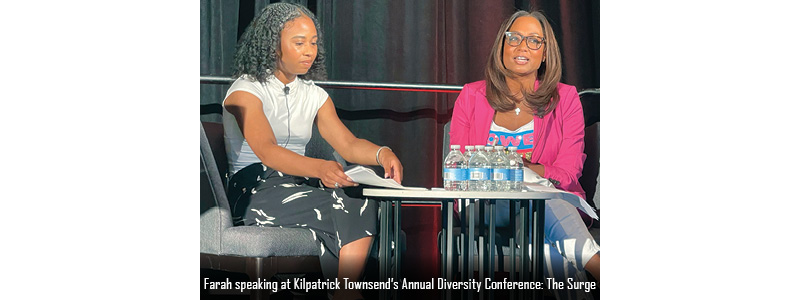
What do you envision for yourself when you look ahead?
I envision myself serving as a pioneering woman of color in the legal and corporate world. My goal is to level the playing field and break down barriers for underrepresented groups coming behind me in the profession.
In addition, I’m always learning and seeking to simply evolve with the world around me. My practice today looks very different from my practice years ago. That’s the nature of the business, which is what makes it fascinating. I want to continue to learn so I can keep pace with all the changes going on around me.
Sara Collin is a Quebec-based lawyer, specializing in legal writing, editing, research and translation throughout Canada.
If you need experienced legal representation, use the Best Lawyers Find a Lawyer tool to connect with legal professionals ready to guide you.

